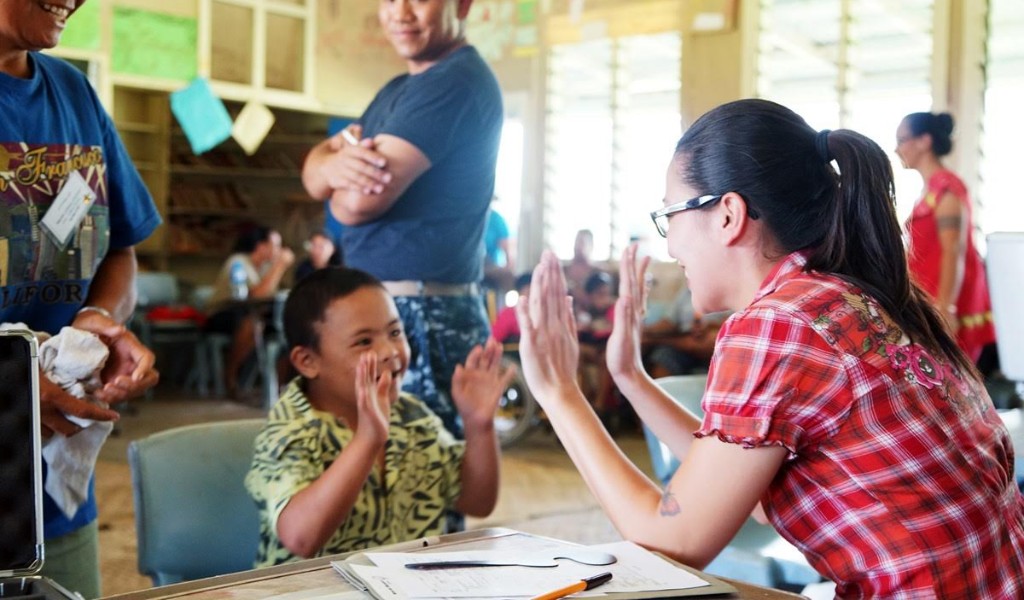Interview with Erna Takazawa on World Health Day
Published on 04/07/2015

Erna Takazawa is Samoa’s first and only optometrist. Her efforts in promoting the need for affordable eye care have helped to lead to free eye care for under-16s and over-65s, free glasses for children and more affordable glasses for adults.
Here, on World Health Day, Erna talks about her work:
What is the focus of your work?
The primary focus of my work is to assist people on a daily basis with their eye health needs. Ultimately, my goal is to educate people about the importance of eye healthcare to ensure that they can live their lives to their full potential.
What can happen to people if they don’t have access to eye healthcare?
There is a substantial difference between those who have easy and affordable access to eye healthcare and those who do not. What I found through my outreaches in the rural areas of Samoa is that many people suffer from ailments that are, or were, treatable.
As an example, last week I saw a man with an eye injury he had suffered a month ago. Had he come to me three weeks ago, his vision could have been saved. However, due to the delay in treatment, his prognosis is not good. These sorts of things happen on a large scale, whether it is an adult with a treatable eye injury or a child with an early stage eye problem.
Not having access to eye healthcare impacts directly on our nation’s people, as they are not living fuller lives, not reaching their full potential and suffering needlessly.
Poor eye sight for a child impacts on areas like their learning and playing sports; Poor eye sight for an adult affects things like their ability to drive, their independence and their productivity at work. So it is very important to have regular eye exams and get the proper glasses, surgery or treatment needed.
What was eye health care like in Samoa before you became an optometrist?
After High School, and while I was trying to decide on my career path, I spent time observing Samoa’s Eye Clinic at the National Hospital. At the time, in 2006, there was only one Indian Ophthalmologist and one Eye Nurse in a tiny room. There was no Optometrist.
Every day there were so many patients waiting to be treated by this small team and seeing the great need cemented my decision to become an Optometrist.
At the time patients received their prescription from the Eye Nurse and were then tasked with figuring out a way to get their own glasses from overseas. Many would send these prescriptions to relatives living in other countries but this led to long waiting times and also the possibility that wrong or inadequate glasses were chosen for them.
How have you improved eye healthcare in Samoa?
We now have one local Ophthalmologist and another one in training. I am the Optometrist and we have 10 Eye Nurses. We also have much larger premises, and have our own optical technician and workshop where we can make glasses locally. We’ve increased the number of people who can be seen daily as well as the effectiveness of their treatment. We have also launched more outreaches in Samoa. The situation has improved, but we always aim to continue to grow our reach and effectiveness.
Since 2012 I personally have seen approximately 15,000 patients, including adults and children with disabilities. Now that glasses are affordable to the entire population we can continue to ensure we bring down the remaining barriers. Things aren’t perfect, but they are improving.
There has never been a nationwide study on visual impairment and blindness in Samoa, as we lacked the funding and people to carry this out in the past. Now this is possible, through our growth and the help of many different organisations. Such a study would give us the statistical basis to then identify with accuracy the areas of need.My goal has always been to reduce avoidable blindness in Samoa by empowering people through education in eye care, growing awareness and early detection and, of course, training and inspiring people to get them on our team and fighting for the cause.
How will The Queen’s Young Leaders Programme help you progress with your work?
I believe in constant self-improvement and learning. I am hoping that the Queen’s Young Leaders Award, through its mentorship program and residential week, will give me the knowledge and experience to help me achieve my goals and dreams. The networking opportunity and the mentorship will be very good for me putting me in contact with like-minded individuals who also share the dream of giving back to society and improving people’s lives.
